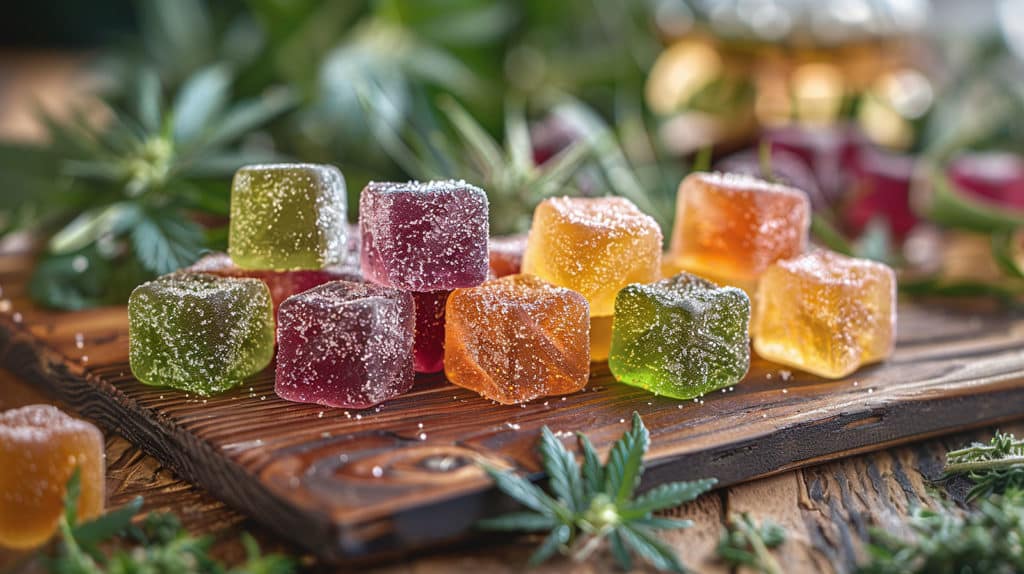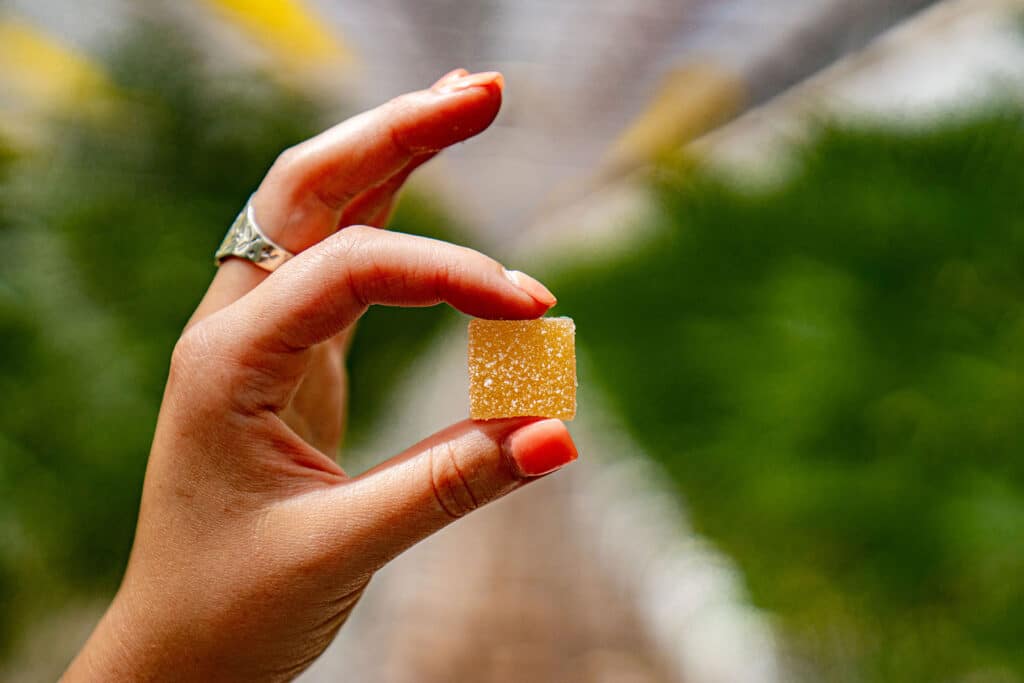Edibles (marijuana edibles and CBD edibles) are typically food products or beverages that contain cannabis compounds, such as THC (delta-9-thc or tetrahydrocannabinol) or CBD (cannabidiol). Edibles deliver the same effects as smoking or vaporizing cannabis without the harsh effects on the lungs. This has made them a popular alternative. The sale of cannabis edibles continues to grow and is expected to reach about 8.24 billion U.S. dollars by 2025.
Table of Contents
- Types of Edibles
- Types of Marijuana
- Choosing the Right Edible
- How Edibles Work in the Body
- Factors That Influence How Long Edibles Stay in Your System
- What Are the Detection Times for Edibles?
- Potential Effects and Duration of Impairment
- How Can You Reduce the Duration of THC in Your System?
- Legal and Professional Implications
- Worried About Edibles Showing Up on a Drug Test?
- Illinois Recovery Center
- Additional Resources
Types of Edibles
Edibles are available in various forms. Here are some common types:
- Baked Goods: The most common types of edibles are brownies and cookies. You can also find cakes and muffins infused with cannabis.
- Gummies: Another popular edible is cannabis-infused gummies. Edible gummies come in a variety of flavors.
- Chocolates: Chocolate lovers can indulge in cannabis-infused chocolate bars or chocolate products.
- Hard Candies: Cannabis-infused hard candies tend to be light on THC and may be suitable for those looking for a slow release of THC or lower doses.
- Beverages: For those who like drinking their cannabis, there are cannabis-infused beverages, such as teas, coffees, and juices.
- Protein Bars: Fitness enthusiasts may opt for cannabis-infused protein bars. This gives them additional protein as well as the benefits of cannabinoids.
- Frozen Treats: Cannabis-infused frozen treats can be ideal for hot summers.
- Dried Fruits: Those who prefer healthier options can choose cannabis-infused dried fruits, such as mango or apricots.

Types of Marijuana
Edibles offer a diverse range of experiences depending on their cannabinoid and terpene content. Understanding the different compounds and their potential effects is crucial for making informed choices. Here’s a breakdown of some common types:
THC-Dominant Edibles
- Effects: THC (tetrahydrocannabinol) is the primary psychoactive compound in cannabis. THC-dominant edibles produce the characteristic “high,” which can include euphoria, relaxation, altered perception of time and space, increased appetite (“munchies”), and heightened sensory experiences. However, THC can also induce anxiety, paranoia, and panic attacks, especially at higher doses or in individuals prone to these effects. Because edibles are metabolized differently than inhaled cannabis, the effects are often more intense and longer-lasting.
- Use Cases: THC edibles are often used for recreational purposes, as well as for managing conditions like chronic pain, nausea, and insomnia.
- Important Note: Due to the delayed onset and intensified effects of edibles, it’s crucial to start with a low dose and wait at least two hours before consuming more. “Start low and go slow” is the golden rule, especially for beginners.
CBD-Dominant Edibles
- Effects: CBD (cannabidiol) is a non-intoxicating cannabinoid known for its potential therapeutic benefits. CBD-dominant edibles do not produce a “high.” Instead, they may offer effects like relaxation, pain relief, reduced anxiety, and anti-inflammatory properties. Research on CBD is still ongoing, but it shows promise for various medical conditions.
- Use Cases: CBD edibles are often used for managing pain, anxiety, inflammation, and seizures. They are also popular among those seeking the therapeutic benefits of cannabis without the psychoactive effects of THC.
CBG-Dominant Edibles
- Effects: CBG (cannabigerol) is another non-intoxicating cannabinoid that is being researched for its potential therapeutic properties. Early studies suggest CBG may have anti-inflammatory, antibacterial, and neuroprotective effects. Some users report that CBG promotes relaxation and focus without sedation.
- Use Cases: CBG edibles are gaining popularity for their potential to address conditions like anxiety, glaucoma, and inflammatory bowel disease, though more research is needed.
CBN-Dominant Edibles
- Effects: CBN (cannabinol) is a cannabinoid that is formed when THC degrades. It is generally considered mildly psychoactive and is often associated with sedative effects. CBN-dominant edibles may promote relaxation and sleep.
- Use Cases: CBN edibles are often marketed as sleep aids. However, more research is needed to fully understand its effects and efficacy for sleep disorders.
Balanced THC/CBD Edibles
- Effects: These edibles contain both THC and CBD in varying ratios. CBD can modulate the psychoactive effects of THC, potentially reducing anxiety and paranoia. Balanced edibles may offer a more mellow and manageable high compared to THC-dominant products.
- Use Cases: Balanced THC/CBD edibles are often used for managing pain, anxiety, and inflammation, as well as for recreational purposes with a less intense psychoactive experience.
Full-Spectrum vs. Isolate Edibles
- Full-Spectrum: Full-spectrum edibles contain a wide range of cannabinoids, terpenes, and other plant compounds found in the cannabis plant. These compounds may work together synergistically, a phenomenon known as the “entourage effect,” potentially enhancing the therapeutic benefits.
- Isolate: Isolate edibles contain only a single cannabinoid, such as THC or CBD. All other plant compounds are removed during the extraction process.
Terpenes
In addition to cannabinoids, cannabis also contains terpenes, which are aromatic compounds that contribute to the plant’s smell and flavor. Terpenes may also have therapeutic effects and can influence the overall experience of consuming edibles. For example, some terpenes are known for their relaxing properties, while others may be more energizing.
Choosing the Right Edible
When choosing an edible, consider your desired effects, experience level, and any underlying health conditions. Start with a low dose and be patient. Read product labels carefully to understand the cannabinoid and terpene content. If you have any questions or concerns, consult with a healthcare professional or a knowledgeable cannabis expert.

How Edibles Work in the Body
When you consume edibles, there are several stages, from consumption to digestion.
- Consumption: The first stage is simply ingesting the edible. Once the edible enters your mouth, your saliva starts to break it down.
- Stomach: After your saliva breaks some of the edible down, the rest moves to your stomach. Here, the digestive enzymes and gastric juices further break down the edible.
- Small Intestine: After the partially digested edible leaves your stomach, it goes to your small intestine. This is where the majority of the absorption of cannabinoids happens. Cannabinoids are fat-soluble, and they are absorbed into your bloodstream through the walls of your intestine.
- Liver Metabolism: After the cannabinoids are absorbed into your bloodstream, they then pass into your liver. Here, they go through what is known as first-pass metabolism. This is where THC is converted into a more potent form of THC called 11-hydroxy-THC. At this stage, you will feel a more intense and longer-lasting effect compared to if you had smoked or vaped cannabis.
- Circulation: After the liver, the cannabinoids are distributed throughout your body. You should start to feel the effects of edibles anywhere from 30 minutes to an hour after consumption.
- Elimination: After the cannabinoids are metabolized, they are then eliminated from your body through your urine.
The Onset and Duration of Edibles Vs. Inhaled Cannabis
The onset of effects when you eat edibles is much slower compared to when you inhale cannabis. When you inhale cannabis, you will feel the effects within seconds or minutes. When you eat or drink edibles, you will feel the effects within 30 minutes to an hour.
There is a difference in duration as well. When you inhale cannabis, the effects start to wear off within the first hour. When you eat an edible, however, the effects can last anywhere from 4-12 hours or even longer.
Factors That Influence How Long Edibles Stay in Your System
For the most part, edibles length of time that will stay in your system between 4-12 hours. However, this can be longer. Several factors influence how long edibles stay in your system. These are:
- Dosage: The amount of THC in your edible will have a direct effect on how long the edible stays in your system. Higher doses mean your body will take a longer time to metabolize the cannabis. Ingesting an edible with 10mg of THC can stay in your system for four to 12 hours. Most edible products list 10mg of THC as a single serving. This often translates to one gummy, for example. If you ingest 20mg of THC or roughly two servings, expect to feel the effects for longer than 12 hours.
- Tolerance: If you use cannabis regularly, you may have developed a tolerance to THC. Those with higher tolerance levels tend to metabolize THC faster, reducing the time it stays in their system.
- Metabolism: Individuals have different metabolic rates. Those with faster metabolisms can eliminate THC faster than those with slower metabolisms.
- Frequency of Use: If you continue to ingest cannabinoids repeatedly, your body won’t have a chance to eliminate the THC. This means there will be traces of THC in your body for longer periods.
- Body Fat Percentage: THC is fat-soluble, which means it is stored in body fat. Individuals with higher body fat percentages may retain THC in their bodies longer than those with lower body fat percentages. In other words, it will take longer for those with more body fat to break down the THC in their bodies.
Edible Duration
| Factor | Description | Impact on THC Duration |
|---|---|---|
| Dosage | Higher doses of THC take longer to metabolize. 10mg may stay in the system for 4-12 hours. Ingesting 20mg can extend the effects for more than 12 hours. | Higher dose, longer duration |
| Tolerance | Regular cannabis users may develop a tolerance, leading to faster metabolism of THC. | Higher tolerance, shorter duration |
| Metabolism | Individuals with faster metabolic rates can eliminate THC more quickly than those with slower metabolisms. | Faster metabolism, shorter duration |
| Frequency of Use | Repeated ingestion of cannabinoids can prevent the complete elimination of THC, resulting in longer retention in the body. | More frequent use, longer retention |
| Body Fat Percentage | THC is stored in body fat, making its elimination slower in individuals with higher body fat percentages. | Higher body fat, longer retention |
What Are the Detection Times for Edibles?
Various types of drug tests are used to determine if there is THC or the THC level in your system. Here are the detection times for edibles:
- Blood Tests: After you consume an edible, THC can be detected in your bloodstream for roughly one to two days. Of course, factors like your metabolism, weight, and body fat will affect the results.
- Urine tests: Urine tests are the most common drug tests. After you consume an edible, THC can be detected in your urine for roughly one to three days. However, if you eat edibles a few times a week, detection may extend to roughly one to two weeks. If you eat edibles daily, detection may extend to roughly a few weeks to a few months.
- Saliva Tests: To detect recent cannabis use, saliva tests are commonly used. After you consume an edible, THC can be detected in your saliva for a few hours after. This can extend to roughly 24-48 hours, depending on your metabolism and the dosage you took.
- Hair Follicle Tests: Hair follicle tests are less commonly used as they can sometimes give false positives. However, after consuming an edible, THC can be detected in your hair for roughly 90 days or more.
Edibles Detection Times
| Test Type | Detection Period | Notes |
| Blood Test | 1-2 days | Affected by metabolism, weight, body fat |
| Urine Test | 1-3 days to a few weeks/months | Varies with frequency of consumption |
| Saliva Test | A few hours to 24-48 hours | Depends on metabolism and dosage |
| Hair Follicle Test or Hair Test | 90 days or more | Can give false positives |
Potential Effects and Duration of Impairment
Because edibles give a longer “high” than smoking cannabis, there are some side effects of marijuana on your mental health that you should be aware of, especially if you have undergone overconsumption or heavy users for a longer period of time.
- Psychoactive Effects: Edibles may result in mood changes and impairment of your cognitive functions, such as concentration and memory. For this reason, it is important to exercise caution when driving or operating machinery.
- Physical Effects: Some individuals experience an increased heart rate, a dry mouth, and an increased appetite.
- Euphoria or Sedation: Depending on the cannabis strain, some people may experience feelings of euphoria. Others may feel drowsy.
- Anxiety or Paranoia: For those sensitive to THC, there may be feelings of paranoia and anxiety, especially if large amounts are consumed.
- Hallucinations or Intense Dreams: Individuals who take large doses may experience intense dreams or hallucinations.
- These effects can last anywhere from 4-12 hours, if not longer.

How Can You Reduce the Duration of THC in Your System?
While edibles can give feelings of euphoria or sedation, not everyone wants to be in an “altered state” for hours. Although reducing the duration of THC in your system is challenging, it’s still possible. Here are some ways you can consider:
- Drink Plenty of Water: One of the best ways to flush the THC out of your system is to drink lots of water. This process detoxifies your body and eliminates the THC faster.
- Cardio Exercises: When you burn fat, you help burn the areas where the THC metabolites are stored. Burning fat forces the THC to be released back into your bloodstream, where it can then be eliminated through your urine.
- Consume Diuretics: Ingesting diuretics can help your body get rid of excess salt and water in your body. As diuretics increase your urine output, you will be eliminating THC in the process. Natural diuretics are cranberry juice, green tea, and black tea.
- Avoid Consuming Any More Edibles: If you’re trying to eliminate the THC in your system, you should avoid consuming any more edibles.
Legal and Professional Implications
Although cannabis edibles are legal in some states, not every state or country looks kindly upon cannabis users. In some countries and states, it is still illegal, and you could end up in jail for possessing edibles.
Legal Implications
Here is a closer look at the legal implications.
- Age Restrictions: In cities where cannabis is legal, there are still age restrictions that you must be aware of. You have to be of legal age to purchase and consume cannabis products.
- Possession Limits: There are also possession limits for personal use. Check the possession limits for your city and state to avoid legal consequences.
- Public Consumption: Even though cannabis may be legal in your city, consuming it in public may not be. There may be fines or penalties for doing so.
- Crossing Borders: If you live in a state where cannabis is legal and then cross over to a state where it is not legal, you could suffer legal consequences.
Professional Implications
For states where edibles are legal, there are still professional implications to consider. Some workplaces want a drug-free work environment and subject their employees to periodic drug tests.
- Drug Testing: Some companies insist on giving drug tests to new hires. There may be regular drug tests as well to ensure the employees remain drug-free.
- Licensing and Certifications: Some professions, such as the healthcare industry, require a negative drug test before you can gain your license or certification.
- Legal and Ethical Responsibilities: Some professions, such as law enforcement, forbid the use of cannabis, even in cities and states where it is legal.
Worried About Edibles Showing Up on a Drug Test?
Don’t let uncertainty jeopardize your future. Our compassionate team at Illinois Recovery Center is here to guide you through understanding detection times and exploring your options.
(888) 472-5004Real people. Real support. No judgment.

Illinois Recovery Center
Edibles are a popular alternative to inhaling cannabis because the effects are longer and can be more intense. Because edibles stay in your system longer, however, it is best to exercise caution when consuming them. Consuming larger doses of edibles can lead to dependency.If you or a loved one has a cannabis addiction, it’s important to seek help. Our team at Illinois Recovery Center, a detox treatment center that offers different treatment plans for individuals suffering from a variety of addictions, such as marijuana addiction or marijuana use. Contact us to find out more.
Additional Resources
[1] https://www.webmd.com/mental-health/addiction/what-to-know-about-how-long-marijuana-stays-in-your-system
[2] https://www.royalqueenseeds.com/us/blog-how-to-get-thc-out-of-your-system-n687
[3] https://www.ccsa.ca/sites/default/files/2019-06/CCSA-7-Things-About-Edible-Cannabis-2019-en.pdf
[4] https://www.ncbi.nlm.nih.gov/pmc/articles/PMC9202751/
[5] https://www.ncbi.nlm.nih.gov/pmc/articles/PMC3570572/
[6] https://www.ccsa.ca/sites/default/files/2019-06/CCSA-Cannabis-Inhaling-Ingesting-Risks-Infographic-2019-en_1.pdf
[7] https://www.healthline.com/health/how-long-do-edibles-take-to-kick-in#common-forms
[8] https://neurosciencenews.com/cud-weight-metabolism-23378/



